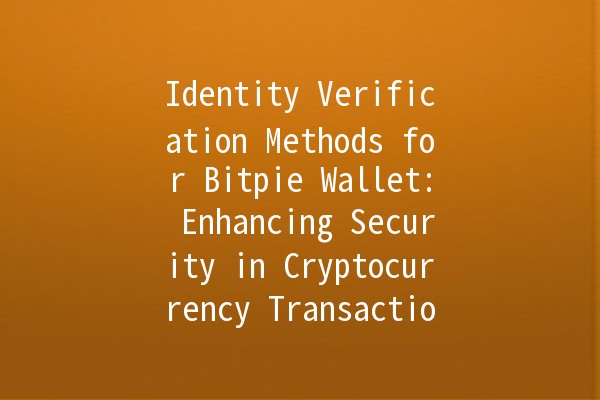
As digital currencies continue to reshape the financial landscape, ensuring the security of transactions has become paramount. Among various wallets available, Bitpie wallet stands out due to its robust security features, including various identity verification methods that are crucial for protecting users’ assets.
In this article, we will delve into the identity verification methods used by Bitpie wallet, explore tips to enhance productivity while securing crypto assets, and provide a comprehensive view into optimizing your experience with this wallet.
Understanding Bitpie Wallet's Identity Verification Process
What is Bitpie Wallet?
Bitpie Wallet is a multicurrency wallet that allows users to store Bitcoin and various altcoins securely. As a key player in the cryptocurrency market, Bitpie places a high emphasis on security, requiring users to undergo a series of identity verification steps before they can fully access its features.
Purpose of Identity Verification
Identity verification in digital wallets primarily serves two purposes:

Types of Identity Verification Methods in Bitpie
Bitpie employs several identity verification methods, including:
Benefits of Strong Identity Verification
Enhanced Security: Users can confidently conduct transactions knowing that their accounts are safeguarded against unauthorized access.
Regulatory Compliance: Helps maintain compliance with global regulations, benefiting the entire cryptocurrency ecosystem.
User Trust: A secure platform fosters trust and encourages more users to participate in the market.
Tips for Enhancing Your Experience with Bitpie Wallet
While security is pivotal, maximizing the user experience can lead to better productivity in managing cryptocurrency. Here are five specific tips to elevate your experience with Bitpie Wallet.
Explanation: Enhancing your account security with twofactor authentication (2FA) adds another layer of protection to your transactions.
Example: Whenever you make a significant transaction, a code is sent to your mobile device. This ensures that even if someone steals your password, they would still need access to your phone to finalize transactions.
Explanation: Regularly updating your wallet and app helps protect against newly discovered vulnerabilities and ensures you have access to the latest features.
Example: Make it a habit to check for updates at least once a month. Enable automatic updates if possible, ensuring that your wallet is always equipped with the latest security protocols.
Explanation: Store your recovery phrases and private keys securely, away from digital devices.
Example: Use a hardware wallet for longterm storage of assets and write down your backup phrases on paper, storing them in a secure location like a safe.
Explanation: Phishing attacks are becoming increasingly sophisticated. Being able to identify these attempts can prevent unauthorized access to your wallet.
Example: Always verify URLs before entering sensitive information. If you receive an unsolicited email or text asking for personal details, do not engage or click on any links.
Explanation: Participating in forums or community groups can provide valuable insights and tips from experienced users.
Example: Join the Bitpie community on social media platforms or cryptocurrency forums to exchange knowledge and receive realtime updates about potential threats or new features.
Common Questions Regarding Bitpie's Identity Verification Methods
Email verification is crucial as it validates your email address, ensuring that only you can make changes to your account settings or perform transactions. It also serves as a means of communication between the wallet provider and the user, providing essential updates and security alerts.
Phone number verification adds another layer of security by sending a onetime password via SMS. This ensures that the user has access to the registered mobile number—a simple yet effective method to protect accounts from unauthorized access.
While KYC is not mandatory for all users, it is required for larger transactions or if you wish to utilize specific services that comply with regulatory requirements. Completing KYC helps improve the overall security of the cryptocurrency market and protects users.
To protect your identity documents, ensure you only upload them through secure platforms like the official Bitpie Wallet website or app. Always verify that you are on the correct website to avoid phishing sites that may seek your documents.
If you lose access to your registered phone number, immediate action is necessary. Contact Bitpie’s customer support to recover your account. They may require additional verification steps to confirm your identity.
Yes, users can create a wallet without completing identity verification; however, your usage may be limited. Most significant functions, such as withdrawals or larger transactions, will generally require some form of identity verification to ensure security and compliance.
Enhancing Security with Best Practices
By adopting best practices, users can further reinforce the security of their Bitpie wallet. Implementing these measures can lead to a more secure and productive experience in managing your cryptocurrency investments.
of Best Practices
Enable 2FA
Keep your software up to date
Store sensitive information securely
Educate yourself against phishing attempts
Connect with the cryptocurrency community
Ultimately, understanding and utilizing the identity verification methods in Bitpie wallet not only bolsters security but also enhances user experience. By remaining informed and adopting best practices, users can effectively navigate the evolving world of cryptocurrency with confidence.
For more insights into enhancing your proficiency with digital wallets and specific cryptocurrency assets, consider engaging with the community or seeking resources that provide ongoing education in this dynamic environment. The growing interest in cryptocurrencies requires us all to adapt and mitigate risks accordingly, while ensuring engagement in a secure trading environment.

